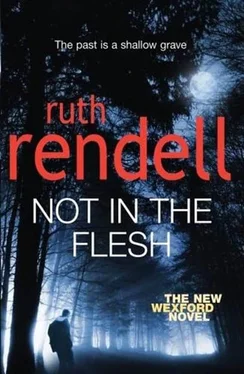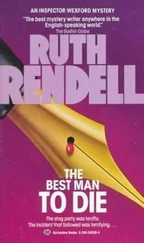I remember him going around to the house where she had a room and coming back rather cross to say that one of the other tenants had told him she'd done “a moonlight flit.” Megan hadn't been there either, but there was no question of her being missing. She just hadn't turned up because Denise had told her she owed £3,000 on her Visa card and meant to go off somewhere for a while “until it had all blown over,” whatever that meant.
Everyone began to believe that my dad and Denise Cole had gone off together. Well, not us and our friends, we didn't believe it. Even if Dad had been the sort of man who'd be unfaithful to his wife with a girl nearly twenty years his junior, we knew he'd never even been alone with her. Mum and Vivien and I were always in the house and Megan was always there when he went around to Denise's.
Did the rumor-and it grew into more than a rumor-influence the police not to look for him? Maybe they wouldn't have done anyway. Maybe he just didn't come into their category of vulnerable people. Up to a point we looked for him. Mum phoned every relative we had and wrote to those whose addresses we had, but her heart wasn't in it. As I've said, she knew he was dead. It was the only possible explanation.
But the insurance company didn't know. The building society with whom they'd got one of those arrangements that ensure that on a partner's death the other one gets possession of the property absolutely, they didn't know. Our house was only ours if Mum managed to go on paying the mortgage. Dad's pension was only hers if she could prove he was dead. Of course she could have gone on the benefit, but she wouldn't do that. She'd been a librarian before she married Dad and she managed to get a job working in a bookshop.
This was all months later and during that time we were living on what was in their joint account and her own savings. She knew it would be a good idea to sell our house and buy a flat which would be big enough for the three of us. But she couldn't sell the house. It didn't belong to her or, rather, it belonged to her and Dad, and Dad wasn't there to agree to the sale. To help make ends meet she let out one of the upstairs rooms, her own bedroom. We kept our room and she moved into Dad's study.
Before that happened it had to be cleared of what was in it. I ought to make it plain how dreadful all this was for her, how painful for all of us but specially horrible for her. To leave their bedroom to a stranger was bad enough but to go into Dad's study which she always looked on as somehow sacred to him, inviolable and absolutely private, to take it apart and empty it, that was agony to her, the ultimate sacrilege. But she did, she had to and we went with her. It wasn't that we asked to be there but that she asked us. I think she didn't want to be alone in there or she was afraid she might collapse in uncontrollable tears.
It sounds strange to say this, but we'd never been in that room before. I mean Vivien and I hadn't. Mum had, of course she had, probably when we were little and she and Dad were getting it ready to be his sort of sanctum. Later on we'd seen into it on our way to bed, for instance, when Dad had come out to say good-night and left the door open. The fact was we hadn't been all that interested. It was just an ordinary little room, the kind of place which in houses like ours was called the box room-because when the houses were first built and space wasn't at a premium people kept bags and suitcases in there? We looked in and saw a place not much bigger than a cupboard with a desk in it and a chair, a filing cabinet, bookshelves full of books, and an awful lot of paper. That's all there was room for. When we went in for the first time, six months after we lost our father and Mum her husband, there was only just room for us all to get in there and then it was only possible because we were small thin people.
There wasn't a computer. Vivien and I had got used to computers, we had them at school, though neither of us then possessed one, and we'd never before seen an electric typewriter.
Mum had to tell us what it was. It seemed to us as ancient, as antediluvian, as a fountain pen or a pound note. What did Dad use it for? we wanted to know. “Working for his postgraduate degree,” was the only answer she could come up with and then she said, “Researching. Writing his thesis.” If this was true, what happened to the thesis? Had he started it? Was it half-completed?
Whatever it had been, there was no trace of it remaining. For all we found, he might have sat up here reading and rereading the books on the shelves. Those books themselves gave no clue. There was the Shorter Oxford Dictionary, Roget's Thesaurus, and Brewer's Dictionary of Phrase and Fable, a Classical dictionary, Ovid's Metamorphoses in a new translation, Icelandic sagas, novels byJ.R.R. Tolkien and Ursula Le Guin and Terry Pratchett, Darwin's Origin of Species, books by Stephen Jay Gould and Richard Dawkins.
We took the books downstairs and stacked them on top of the bookcase. There was no other space. The papers we put up in the loft and the blank sheets we kept to use for writing letters on. But we hardly wrote any letters, we had no one to write to, and the sheets of paper are still in the house where I have lived alone since Mum died. We found only one piece of paper that might have given us some hint as to where Dad went when he left Maurice Davidson's funeral, but it didn't. I don't really know why I thought it might. Maybe because it was the only thing we found in there in Dad's handwriting. Oh, there were check stubs, of course-he attended to business in that room, paying bills, completing forms, and that sort of thing-but this scrap of paper, half an A4 sheet, was the only thing he left behind that he'd written by hand. It was hard to escape the conclusion that he'd deliberately cleared the place of anything which might have provided a clue to where he was going and what he intended to do. I actually said this to Mum, but she wasn't having any of it. “He didn't know he was going to die,” she said, “and I know he's dead. I just know it.”
And the scrap of paper that was the only thing in his handwriting? It was a list of names of contemporary authors, mostly science-fiction writers, all of them still alive, along with a list of publishers. Underneath he had written “Fact-finding? Proofreading? Editing?”
Mum said it wouldn't help us find where he had gone that afternoon. Years before, she remembered, when they were short of money and she couldn't take a job because they had us, Dad had considered trying to get work as a publisher's reader. He knew such a thing was possible because publishers employed people to read manuscripts. But he never did. The pay would have been too little to make it worth his while. We actually phoned the publishing houses on the list, but none of them had ever heard of him. So that was no use. Don't they call it a red herring?
Meanwhile his study was cleared-he had been gone for over a year by then-and Mum moved in, leaving her bedroom for the lodger. Vera was a quiet tidy sort of woman, but Vivien and I never liked her. We resented having to share a bathroom with her, though we had never minded sharing with Dad. It must have been much more of a hardship for her sharing with us. We were coming up to the age when girls take over a bathroom, dropping towels on the floor and leaving messes behind them. She fried most of what she ate and our kitchen always reeked of chip fat. Mum minded that more than almost anything, more than sleeping in that tiny room, which, after all, must hourly have reminded her of Dad sitting in there in happy silence, more than having to sell the car and forgo summer holidays.
You can get used to anything, can't you? Our lives were utterly changed but we still had school, which we both loved, and our friends and the grandparents who were unendingly good to us. We didn't know it at the time, children aren't interested, but Mum told us later that Dad's mother and father paid the mortgage for two years and all the services bills. Our gran died when I was fifteen and Vivien was thirteen, and Grandad moved in with us. That was the end of Vera with her chip pan and the stink of cheap perfume she left in the bathroom, the end too of watching everything we spent and denying ourselves anything new. It was three years since my mother had even bought herself a sweater, still less a pair of shoes. Things were different with Grandad there. He had sold his own house for what Mum said was an amazing amount of money, he had a very good pension as well, and he brought his car with him.
Читать дальше











